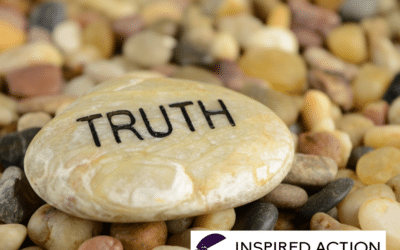Thinking Outloud

Putting An End to Self-Betrayal
This blog is about how we cause ourselves so much harm by practicing the fine art of lying, and most especially, lying to ourselves, also known as self-betrayal.
Early in our work together, I ask my clients who feel lost in confusion, “What are you lying about?” “Who are you lying to?” “What lies do you tell yourself?” This can bring a jolt of defensiveness, but it can also be the gateway to a treasure-trove of buried self-knowledge.
In her Book The Way of Integrity, Finding the Path to Your True Self, Martha Beck describes 3 kinds of lies.
- Black lies: Deliberate premeditated deception.
- White Lies: The things we say, knowing they are not true to maintain social equilibrium. Sometimes these are involuntary self-deceptions. Often, we don’t know the truth.
- Gray Lies: The fudge factor, we tell stories to preserve our concept of ourselves. Sometimes we tell gray lies to preserve an emotional connection to someone who mistreats us. To accept mistreatment is to participate in a lie.
Lying of any kind, white, gray or black has a significant effect on our brains, as well as our bodies. Lying and keeping secrets has been linked to a whole host of diseases: heart disease, cancer, high cholesterol, and emotional symptoms like anxiety, depression and anger issues. Studies have shown that all lies, whatever the reasons, create a similar negative outcome.
Self-betrayal is the worst lying of all and creates the worst kind of suffering. Often this self-betrayal has roots in childhood and can eventually turn to self-blame.
Let’s take a look at another perspective on the harm caused by lying. This time we will use imagery of a European from the 14th century, Italian poet Dante Alighieri.
In his epic work The Divine Comedy, Dante wrote to tell us how to find happiness. Perhaps the most famous part of the poem is the descent into Dante’s Inferno. In this part of the work, Dante describes meeting his teacher, the ghost of Virgil, who guides him down through deeper & deeper circles of hell.
At each circle along the way, Dante and Virgil encounter even more and more despicable criminals until they reach the 8th, 9th & 10th circle of hell where the worst of the worst reside, liars!
Why, you may ask, is lying so evil? Don’t we sometimes lie with the best intentions? Yes, but keep in mind that without lying, every other kind of vice is impossible to practice.
In our current day vernacular, inferno means fire but in Dante’s hell the deepest circles are cold – frozen solid. Perhaps this frozen state best describes the results of lying, especially to ourselves. We become disconnected emotionally, feeling increasingly lonely, numb, and ready to crack.
Years ago, I was involved with a service club filled with respected business leaders in my community. After years of dedicated service, I rose through the ranks to be elected President. At the same time, I was keeping a very big secret from my friends and colleagues. My marriage was coming apart at the seams. In those days I had a well-practiced form of hiding in plain sight. One I crafted in my family of origin and honed over decades. Never let ’em see you sweat.
The gray lies flowed from me like a fountain. I didn’t understand then what I know now. Those gray lies and lies of omission kept me isolated and alone. I was leading the organization and never felt less like someone who belonged. It was one of my darkest times.
In her groundbreaking work, Atlas of the Heart, Brene Brown talks about how we can communicate our truth in a way that connects us to others and still keeps us safe.
But first let’s reflect on Brene’s truth-telling mantra, clear is kind. In 12-Step recovery we frame it as “Say what you mean, but don’t say it mean.” In both Brene Brown’s world as well as in 12-Step Recovery, this describes a vital tool for healthy living- setting boundaries! Boundaries are foundational to truth telling as well as authentic connection & belonging.
Brene Brown
Now when physical discomfort in the body, anxiety or feelings of anger indicate that some untruth is frozen beneath the surface, I encourage my clients as well as myself to ask the following questions * [from Martha Becks The Way of Integrity, Journey to the Frozen Lake,]
- What was the last lie you told?
- What were you hiding with this lie?
- From whom were you hiding it?
- What do you fear this person/ these people would do, think or feel about you if they knew the truth you were hiding?
When you decide to unfreeze your hidden pain, don’t go it alone. Find a coach, a therapist, and a circle of support who can help you to move forward. Like Dante’s teacher and guide the ghost of Virgil, our support may come in a form we don’t expect.
As we tell the truth to ourselves and others, our body, mind, and spirit align in a calm, clear and open way. Our bodies can relax. Our minds are clear, and all our emotions are available to us. From this place of true integrity, we can chart the path to freedom.
Read More Posts:
Truth Telling- Martha Beck & the 12 Steps of AA
“When we grasp truth- any truth, from the correct solution to a math problem to the capacity for love- all our ways of knowing align.” - Martha Beck, The Way of Integrity In her most recent book, The Way of Integrity, Martha Beck uses the metaphor of Dante’s Inferno...
Truth Telling- Martha Beck & the 12 Steps of AA
“When we grasp truth- any truth, from the correct solution to a math problem to the capacity for love- all our ways of knowing align.” - Martha Beck, The Way of Integrity In her most recent book, The Way of Integrity, Martha Beck uses the metaphor of Dante’s Inferno...
Truth Telling- Martha Beck & the 12 Steps of AA
“When we grasp truth- any truth, from the correct solution to a math problem to the capacity for love- all our ways of knowing align.” - Martha Beck, The Way of Integrity In her most recent book, The Way of Integrity, Martha Beck uses the metaphor of Dante’s Inferno...

